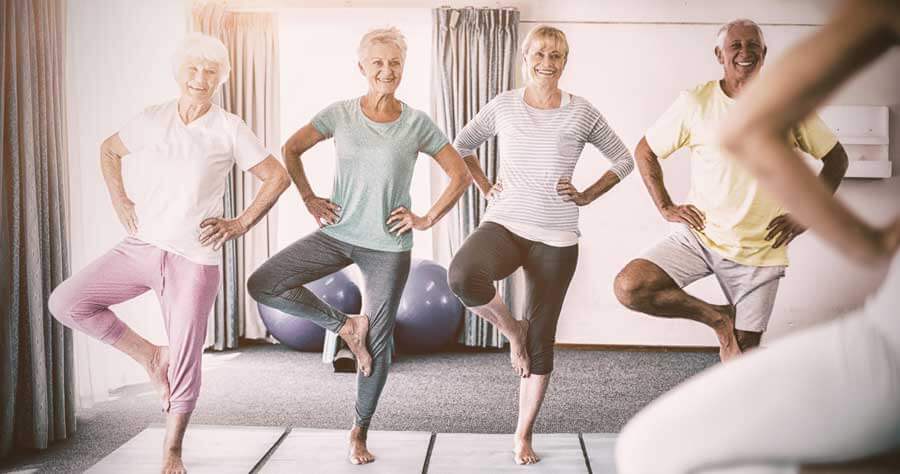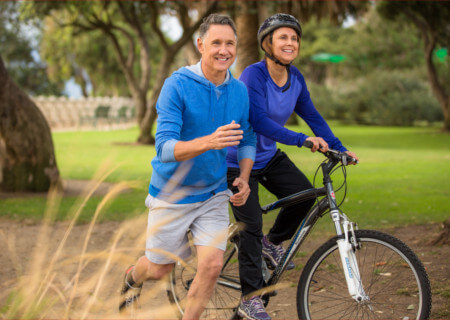Falls are common, but serious events that have the potential to lead to life-altering injuries. In fact, 20% of falls result in injury like fractures or head/brain injuries. Although falls can happen at any age, they are more common in older people. It is estimated that at least 3 million older people go to the emergency room because of fall-related injuries each year. Fear of falling tends to increase with age, and can cause people to avoid participating in activities they would normally do or enjoy. In many cases, falls are preventable. Reduce your fall risk by following these 5 steps below.
1. Talk to your doctor
Have a discussion with your doctor about any concerns you may have surrounding falls. They will be able to evaluate you, assess your fall risk based on your current medical condition(s), and provide guidance on ways to reduce your fall risk. They can identify medications you take that may contribute to dizziness and determine if it is time for an eye or hearing test to take place as well. Always be sure to inform your doctor of any falls that you have, even if an injury does not occur.
2. Exercise regularly
Leg and lower extremity weakness, poor balance, limited flexibility, and sedentary lifestyle are all risk factors that increase the likelihood of falls. Participating in regular physical activity and exercise can improve strength, cardiovascular and muscular endurance, flexibility, and balance. Not only will you be able to move better, but you may also become more confident in your ability to walk, exercise, and perform other daily activities without falling.
3. Make home modifications for safety
The home can present numerous hazardous situations that could result in a fall. It is important to get rid of potential hazards and make modifications to the home environment so that it is as safe as possible. These changes may include:
- Picking up things that could potentially be tripped over such as throw rugs and unnecessary clutter
- Keeping the house well lit with easy accessibility to lighting at night
- Adding in equipment such as handrails on stairs, grab bars near the toilet or tub, and raised toilet seats to make performing daily tasks easier
4. Use an assistive device as needed
If you experience difficulty walking or changing positions, such as transitioning from sitting to standing, an assistive device may be helpful to prevent falling. When used appropriately, canes, walkers, and other aids can provide increased stability and support. They can help you maintain balance and also help reduce the energy needed to move by supporting some of your body weight. Assistive devices can help promote a more independent lifestyle without sacrificing safety.
5. Take your time when moving
We are often in a rush to get moving, but moving too quickly can be risky. Have you noticed that you get dizzy when sitting up after laying down or when moving from standing to sitting? This is known as orthostatic hypotension, and it is the result of a drop in blood pressure that occurs when you get up too quickly. When moving from different positions, take your time and remain in the position for a few moments before trying to get up. It is also important to be cautious on surfaces that are uneven or slippery, or areas that are unfamiliar. It is always better to take more time to ensure safety than to be in a hurry and fall.
A physical therapist is a trained professional that can help you prevent falls. They can perform an evaluation and develop a treatment plan specifically tailored to your needs. That plan may include:
- Strength training of the lower extremity to improve balance while standing and moving
- Balance training at varying levels of difficulty on different surfaces to challenge and improve your ability to maintain balance
- Endurance training to improve overall health
- Gait and transfer training to ensure you are using proper technique when walking and transferring positions to optimize safety
- Education on proper use of assistive devices, home modifications, and any other pertinent information or recommendations
If you are concerned about falling or have actually experienced a fall, call Respire Physical Therapy at (703) 671-1871 or click here to schedule an evaluation and regain your confidence and independence today!
Tags: Gait, choosept, arlingtonva, fallschurchva, ptworks, Physical Therapy, annandaleva, physical therapist, Fall Risk, Balance, Fall Prevention



